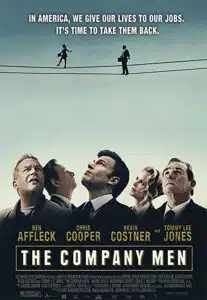
Cinema has always been viewed as a refuge from daily life. Movie audiences temporarily access a theatre of protected dreams and suspend reality through the ease and relatively low cost of admission. This promise of willful escapism is itself a myth, though, for Hollywood films were once far better balanced between the lightness of fantasy and the grounding of reality. During the Great Depression, cinema was indeed a respite, offering a glittering, glamorous world few could attain even in the best of times, but some of the movies, such as Charlie Chaplin films, hardly sacrificed entertainment at the expense of ignoring the wider world from which its audience came.
The same, unfortunately, cannot be said for the majority of movies that hit modern-day cineplexes. While the current recession (in length and severity) is the nearest rival to the Great Depression the United States has experienced, one would be hard-pressed to find any noticeable trace of this reality in its popular entertainment. The reasons are both varied and obvious as major Hollywood studios have little incentive to produce serious dramatic fiction about the financial crisis for a weary public unlikely to view themes such as economic collapse and chronic unemployment as entertaining.
The few movies that have broached the topic have tended either toward bitter comedy (Up in the Air) or underwhelming results (Wall Street: Money Never Sleeps). The one quiet exception to this list is the 2010 movie The Company Men. To date, this is the most mainstream dramatic film to directly explore the reality of our uncertain economic times. The story focuses on many of the harsh realities and upsetting themes from this current recession, such as corporate greed begetting corporate downsizing begetting protracted individual unemployment begetting limited opportunities begetting altered and fractious lives begetting despair and frustration begetting hope and renewal.
Specifically, The Company Men explores the narratives of three high-powered senior executives as they are summarily kicked off the corporate ladder and forced to re-navigate their lives. Bobby Walker (Ben Affleck), Gene McClary (Tommy Lee Jones), and Phil Woodward (Chris Cooper) have all been faithful high-level employees at GTX, a Boston-based shipping conglomerate. The company, however, is a victim of its own success and must sacrifice personnel to satisfy debt and shareholder concerns.
These characters are very much company men: individuals who willingly traded personal identity for the rewards of corporate protection and financial security. All three men struggle to keep up appearances and translate the success they earned at GTX to a world indifferent of their achievements and unimpressed with their air of prestige. The greater struggle is internal, and in seeking new employment they realize that they must now work to build and maintain their own, true identity.
It’s quite easy to dismiss the film’s white, upper-class milieu as not being a true reflection of the hardships faced by the majority of unemployed workers. To do so, however, would be a mistake, as The Company Men is distinguished by the attention it pays to the totality of loss through unemployment. While sober and considered in tone, The Company Men strikes a balance between anguish and hope.
As rooted in reality as the film may be, The Company Men remains, without doubt, a product of its unique environment: Hollywood. Character development does not feel 100 percent organic, plot details grow murky upon closer inspection, and problems are resolved (or at least, the potential is there for them to be solved) with an elegant simplicity that only studio screenwriters could craft.
The Company Men is the feature film debut of the venerable television writer and director, John Wells (er, The West Wing) and true to form the movie is a thoughtful, articulate, and deeply considered piece of dramatic fiction. The film, however, suffers a bit from a subdued sense of drama that feels better structured for the small screen.
What elevates The Company Men from its schematic and a rather formulaic plot is the cast. Tommy Lee Jones and Chris Cooper are both particularly strong and shade their characters with subtle ambiguities and interesting contradictions that feel authentic and compelling. Rosemarie DeWitt and Kevin Costner also bring quiet strength to their roles as Bobby’s wife and brother-in-law.
There’s little mystery as to why The Company Men underperformed at the box office, as the story of job loss is hardly event entertainment for a public made weary by such real and constant economic uncertainty. The film’s recent release on DVD should, hopefully, allow for a wider audience at home. The DVD is fairly well apportioned with supplemental material. Extras on the disc include deleted scenes, an alternative ending, commentary from writer and director John Wells, and a standard Making Of featurette.
Flawed though it may be, The Company Men remains a painfully relevant film. It’s an intimate and considerate picture that offers no easy solutions but encourages strength by virtue of its intent not to ignore our new and uncertain reality.

